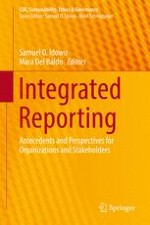2019 | OriginalPaper | Chapter
17. King Codes on Corporate Governance and ESG Performance: Evidence from FTSE/JSE All-Share Index
Authors : Federica Doni, Antonio Corvino, Silvio Bianchi Martini
Published in: Integrated Reporting
Publisher: Springer International Publishing
Activate our intelligent search to find suitable subject content or patents.
Select sections of text to find matching patents with Artificial Intelligence. powered by
Select sections of text to find additional relevant content using AI-assisted search. powered by
